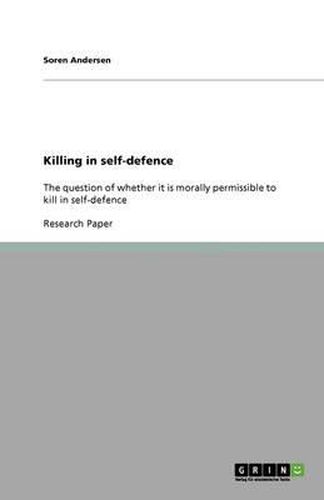Readings Newsletter
Become a Readings Member to make your shopping experience even easier.
Sign in or sign up for free!
You’re not far away from qualifying for FREE standard shipping within Australia
You’ve qualified for FREE standard shipping within Australia
The cart is loading…






Research Paper (postgraduate) from the year 2009 in the subject Ethics, University of Manchester (Political Theory), language: English, abstract: This paper will investigate what implications this new position poses to Quong’s rejection of Otsukas stance on the moral impermissibility of killing the innocent aggressor and the innocent threat in self-defence, as well as the implications it might have on Thomson’s own 1991 views (Quong 2008:6) 1 In the case of the bystander-Trolley-case 1 The Ethics of KillingKilling in Self-Defence My conclusion on this shall reveal that I generally agree with the conclusions of Quong, though I disagree with the way he reaches these conclusions. In doing this, I shall present some scenarios which might not fit neatly into the proposed categories of Thomson, in order to examine whether the categorisation hitherto used is adequate and to investigate the possible implications this might have for a theory of killing in self-defence
$9.00 standard shipping within Australia
FREE standard shipping within Australia for orders over $100.00
Express & International shipping calculated at checkout
Research Paper (postgraduate) from the year 2009 in the subject Ethics, University of Manchester (Political Theory), language: English, abstract: This paper will investigate what implications this new position poses to Quong’s rejection of Otsukas stance on the moral impermissibility of killing the innocent aggressor and the innocent threat in self-defence, as well as the implications it might have on Thomson’s own 1991 views (Quong 2008:6) 1 In the case of the bystander-Trolley-case 1 The Ethics of KillingKilling in Self-Defence My conclusion on this shall reveal that I generally agree with the conclusions of Quong, though I disagree with the way he reaches these conclusions. In doing this, I shall present some scenarios which might not fit neatly into the proposed categories of Thomson, in order to examine whether the categorisation hitherto used is adequate and to investigate the possible implications this might have for a theory of killing in self-defence